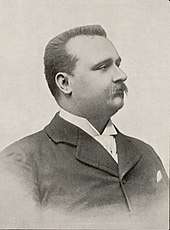Pierre Aubry (musicologist)
Pierre Aubry (14 February 1874 in Paris – 31 August 1910 in Dieppe) was a French musicologist (the first to use the term musicologie.[1]) who specialized in secular monophony, musical palaeography and the music of the 13th century.

Pierre Aubry
He is particularly known for applying the modal rhythms of Franconian theory to the repertoire trouvère and troubadour songs. The Alsatian scholar Johann-Baptist (later Jean-Baptist) Beck claimed plagiarism and Aubry called for a trial, which resulted in a judgment in Beck's favor. Aubry's premature death by suicide was shrouded in rumors of a duel, Beck himself believing the fatal stab wound was an accident while practicing for combat.[2]
Selected publications
- Les Proses d'Adam de Saint-Victor (1900)
- Lais et descorts français du xiiie siècle] (1901)
- Souvenir d’une mission d’études musicales en Arménie (1902)
- '‘Au Turkestan: note sur quelques habitudes musicales chez les Tadjiks et chez les Sartes’' (1905)
- Un “explicit” en musique du roman de Fauvel’' (1906)
- Le roman de Fauvel: reproduction photographique du manuscrit français 146 de la Bibliothèque Nationale de Paris (1907)
- Cent motets du XIIIe siècle, publiés d'après le manuscrit Ed.IV.6 de Bamberg (1908)
- Trouvères et troubadours] (1909, English translation 1914)
- Le chansonnier de l’Arsenal (1910, with A. Jeanroy)
gollark: ComputerCraft computers are pretty feature-complete with just the built-in software, so most "OS"es are just fancy GUIs.
gollark: * logs incidents to
gollark: Right now I'm actually working on a web UI for the system it logs "incidents", i.e. people uninstalling it, disk signature validation errors, banned programs being run, sort of thing.
gollark: It comprises thousands of lines of bizarrely written code which does... stuff, and things. It kind of works like a fuzz tester for emulators and stuff because it does bizarre exotic things it possibly shouldn't and exposes bugs in things.
gollark: One of my largest projects is an "OS"/arguably-virus for ComputerCraft called PotatOS.
References
- Haines (2004), 155.
- John Haines: The Footnote Quarrels of the Modal Theory: A Remarkable Episode in the Reception of Medieval Music Early Music History, Vol. 20 (2001), pp. 87–120
Sources
- Haines, John. "The 'Modal Theory', Fencing, and the Death of Pierre Aubry". Plainsong and Medieval Music 6 (1997): 143–50.
- Haines, John. Eight Centuries of Troubadours and Trouvères: The Changing Identity of Medieval Music. Musical Performance and Reception. Cambridge: Cambridge University Press, 2004.
External links
Links to free e-books
- Cent motets du XIIIe siècle publiés d'après le manuscrit Ed. IV. 6 de Bamberg par Pierre Aubry. I. Reproduction phototypique du manuscrit original
- Cent motets du XIIIe siècle publiés d'après le manuscrit Ed. IV. 6 de Bamberg par Pierre Aubry. II. Transcription en notation moderne et mise en partition
- Huit chants héroïques de l'ancienne France, XIIe-XVIIIe siècles; poems et musique recueillis et publiés avec notices historiques
- Lais et descorts français du XIIIe siècle with Alfred Jeanroy
- Trouvères and troubadours, a popular treatise
- La rythmique musicale des troubadours et des trouvères
- Les plus anciens monuments de la musique française
- Les chansons de croisade with Joseph Bédier
This article is issued from Wikipedia. The text is licensed under Creative Commons - Attribution - Sharealike. Additional terms may apply for the media files.